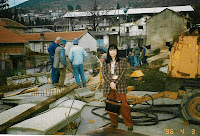 Men rule and make wars. Women lose husbands, brothers, sons, homes and their dignity when they become spoils of conquests. One may think that conflicts are in fact anathema to this period of human development when nation-states have already been formed. And yet, ethnicism, religious fanaticism and excessive political power continue to fuel conflicts and the victims, by a large majority are women and children.
Men rule and make wars. Women lose husbands, brothers, sons, homes and their dignity when they become spoils of conquests. One may think that conflicts are in fact anathema to this period of human development when nation-states have already been formed. And yet, ethnicism, religious fanaticism and excessive political power continue to fuel conflicts and the victims, by a large majority are women and children.The Swedish women organisation "Kvinna till Kvinna" or Woman to Woman came out with a timely criticism on the absence of women's role in the reconstruction effort of war-ravaged countries, in particular, why the Swedish Foreign Minister Carl Bildt - who played a significant role in the EU peace and reunification effort of Bosnia and Herzegovina, has hardly mentioned women in his statements concerning Sweden's and even EU's role in the re-building and democratization of countries like Iraq.
This is no surprise to me at all because the same political miscalculation characterized the EU Administration of Mostar, EUAM when it undertook its task of reconstructing the bombed-out old city in Bosnia-Herzegovina. During a three-year period, I visited Mostar, Sarajevo, and its adjacent villages and I saw at close range how EUAM did the arduous task of unification and reconstruction. While there were advisers for different spheres: economy, education, infractructure, health and refugee - there was none for women affairs. And to think that the main survivors of the ethnic conflict and cleansing were women and that the greatest number of dislocations were among domestic refugees.
I was doing my masters thesis on "Nationalism and Ethnic Conflict" with EUAM as the empirical part of it. But my heart burned for some involvement in helping the displaced women who lost their relatives and homes, their work and their livelihood. At that time, there were not so many NGOs, particularly women organisations in Mostar. Women victims could not go anywhere to sit down, unload their psychological and emotional burdens, talk to others in similar situation. They were like zombies in a city emptied of life and joy.
Then I finally succeeded to gather some women representatives who were prepared to organize themselves and get some re-training program for livelihood. I brought up the idea to the EUAM Administrator Hans Koschnick. This was after two years ofEUAM work in Mostar. Koschnick gamely came along and sat with the local women, listened to their problems and they waited for an answer. None came, no promise of funds to create a women livelihood program. Then Koshnick told me: "Where have you taken me?" I replied: " Sir, to the heart of your reconstruction project".
When I brought up this women project with the Swedish Development Authority, or SIDA, I didn't get very far. The priority was the upkeep of the Swedish peace-keeping forces and the rehabilitation of women lives through education waited and waited. At that time, "Kvinna till Kvinna" was administratively weak and thinly spread in several conflict areas.
It is with the same pessimism that I view the UN and Iraq government's re-building project because whatever the final document says on respecting women and minority rights, it is half-hearted and cosmetic. Women organizations will have to work very hard in order to be heard, in order to count in the re-making of their society. And they have to do it without any help from men.
